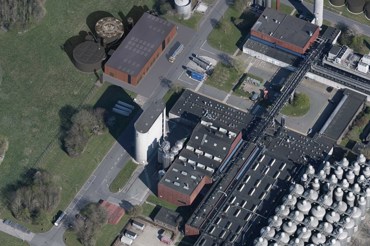Land based aquaculture: RAS design
At NIRAS, we deliver tailored Recirculating Aquaculture System (RAS) Design and optimisation services, supporting the industry from initial feasibility studies to fully operational fish farms. Whether you are establishing a new facility or optimizing an existing one, our team of experts ensures a cost-effective and sustainable approach to land-based fish farming.
Key system sections based on growth stages:
Broodstock: Optimal management for healthy, productive breeding stock.
Egg Incubation: Precise conditions for high hatch rates and healthy larvae.
Start Feeding: Efficient systems supporting early fry growth.
Nursery: Controlled environments for juvenile fish development.
Smoltification: Facilitating transition from freshwater to seawater.
Growout: Optimising growth rates and health of mature fish.
Purge: Ensuring final product quality for market readiness
Grading: Systems designed to facilitate sorting between growing section reducing stress on fish, ensuring uniform growth and reducing competition.
The Recirculating Aquaculture System (RAS) is pioneering the future of land based fish farming. By utilizing a closed-loop system to recycle water, it ensures full control over the biological conditions, leading to healthier fish that grow efficiently and predictably. This increases both production rates and profitability. Environmentally, the technology is highly sustainable, as it recycles over 99% of the water, drastically reducing the need for new water and facilitating easy treatment of effluent.
Tailored design
At NIRAS, we focus on creating RAS designs tailored for tender processes rather than turnkey solutions. This means we don’t have to push equipment sales and compromise on quality to stay within budget as we do not manufacture equipment or act as third-party suppliers. Instead, we use our extensive knowledge and experience to craft high-quality, detailed designs. This approach gives our clients the flexibility to choose the best suppliers and solutions, ensuring both safety and optimal project outcomes. NIRAS is here to assist throughout the tender process, providing support and expertise every step of the way.
Biology and chemistry
At NIRAS, our approach begins with a thorough understanding of the biological and physiological characteristics of the fish species. Instead of designing a system first and then adding the fish, we prioritize gathering detailed biological knowledge. This enables us to develop structured production models that reflect the specific needs and behaviors of the fish species. By doing so, we ensure efficient logistics throughout the entire production process. Additionally, we conduct bio-dimensioning and mass balance assessments for each growing section/module, providing our clients with comprehensive production and processing concepts that are easy to understand and relate to.
Key water quality parameters
-
Ammonia (NH3): A toxic waste product from fish metabolism, excreted primarily through gills. Must be kept minimal.
-
Nitrite (NO2-): An intermediary product in nitrification process, blocking oxygen uptake in the blood. Maintain safe levels.
-
Nitrate (NO3-): Formed from nitrification of ammonia and nitrite. Monitor levels for optimal fish health.
-
Carbon dioxide (CO2): Produced by fish metabolism and bacterial breakdown organic waste. Control levels to prevent growth issues.
-
Oxygen (O2): Vital for aquatic health as it is used by fish to oxidises food. Ensure proper levels for optimal growth.
-
pH levels: Influences toxicity of other compounds and uptake, release of O2 and CO2. Maintain stability.
-
Other parameters: Manage hydrogen sulphide, chlorine residuals, and metals for aquatic health.

Technology and solution
The core principle of RAS is to reuse water multiple times. By treating the water effectively, we can maintain a stable environment for fish, ensuring consistent growth rates and optimal health.
Key technological components
-
Mechanical filtration: Advanced mechanical filters remove particulate matter such as food waste and fish feces (larger than 40 microns). This process is crucial for maintaining water quality and reducing the organic load on the biofilter.
-
Pumping: Single point, low head, pumping system for maximum energy efficiency and low operating costs. Water then go by gravity throughout the system until reaching back the pumping system.
-
Biofilters: Biofilters, such as Moving Bed Biofilm Reactor (MBBR), play a crucial role in transforming ammonia into less harmful nitrate through the nitrification process. This biological transformation helps maintain water quality This ensures that ammonia levels remain safe for fish.
-
Carbon dioxide management: Elevated CO2 levels can harm fish growth. Our systems use effective CO2 removal technologies to maintain optimal levels, including in-line degassing units that actively strip CO2 and free nitrogen using air.
-
Oxygenation: Efficient oxygenation methods, such as nano bubble super oxygenation, oxygen boxes, ceramic dosing, Venturi systems, and oxygen cones, ensure high levels of dissolved oxygen (DO) in the water, which is vital for the health and growth of aquatic organisms.
-
Temperature control: Maintaining a stable temperature is essential for optimal fish growth. Our systems include temperature control technologies, such as heat exchanger, to ensure consistent conditions throughout the year.
-
UV and ozone: Managing bacterial dynamics is crucial for maintaining a healthy environment for fish. UltraViolet sterilization to suppress bacterial and viral growth and remove excess ozone, ensuring water safety. Additionally, ozonated protein skimming helps remove micro-particulates and clarify the water, improving overall water quality for the fish.
Aquaculture design brochure
At NIRAS, we are dedicated to supporting your aquaculture projects with our comprehensive advisory services. Our team of experts is here to guide you through every stage of your project, ensuring success and sustainability. Our commitment to excellence and client success makes us the ideal partner for your aquaculture projects. Reach out to us, and we'll work together to achieve your goals and drive your success in the aquaculture industry.
Our Services:
- Pre-project consultancy: Plan and organize your project efficiently from the start.
- Production advisory: Optimize your facility's operations with expert support.
- Support: Training, and documentation for enhanced performance.
- Strategic development: Develop business strategies and conduct technical due diligence
- Sustainability focus: Implement environmentally friendly practices and technologies.
Reach out:



